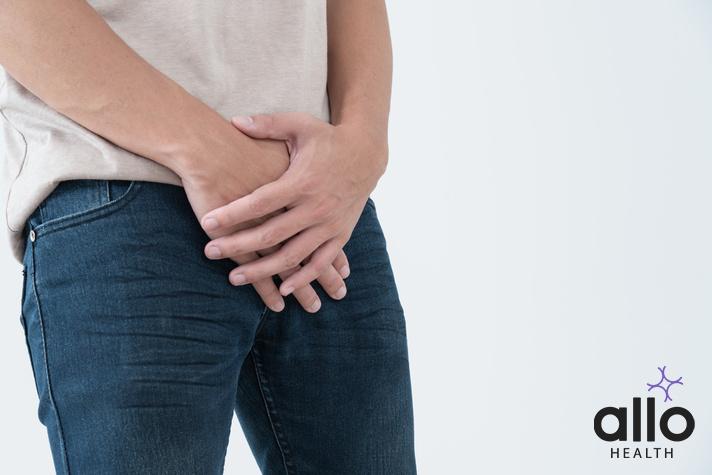Does Obesity Cause Premature Ejaculation?

Allo Health is dedicated to personalized well-being, offering support and trusted information tailored to individual health goals. The platform emphasizes human-generated content, led by a distinguished medical team of experts, including physicians and sexual health specialists. Their commitment to credibility involves rigorous fact-checking, authoritative research, and continuous updates to ensure accurate, up-to-date information. Allo Health's unique approach goes beyond conventional platforms, providing expert-led insights and a continuous commitment to excellence, with user feedback playing a crucial role in shaping the platform's authoritative voice.

Dr Sanina Mansoor holds MBBS degree from Yenepoya university,Mangalore.She has 8 years of experience working as a medical officer at various health centres and medical colleges.
Why This Was Upated?
Our experts continually monitor the health and wellness space, and we update our articles when new information became available.
Updated on 15 February, 2024
- Article was updated as part of our commitment to diversity, equity, and inclusion.

"The following blog article provides general information and insights on various topics. However, it is important to note that the information presented is not intended as professional advice in any specific field or area. The content of this blog is for general educational and informational purposes only.
Book consultation
The content should not be interpreted as endorsement, recommendation, or guarantee of any product, service, or information mentioned. Readers are solely responsible for the decisions and actions they take based on the information provided in this blog. It is essential to exercise individual judgment, critical thinking, and personal responsibility when applying or implementing any information or suggestions discussed in the blog."
Premature ejaculation (PE) and obesity are two health concerns that can affect men physically and emotionally. It is no secret that one’s health and lifestyle choices can influence their sexual performance. Recent studies have shown that there is indeed a link between obesity and premature ejaculation in men. As a result, understanding the link between these two health concerns is essential for men who want to improve their overall well-being and sexual function.
What Is Premature Ejaculation?
Premature ejaculation (PE) is a common sexual dysfunction that occurs when a man ejaculates sooner than he or his partner would like during sexual activity. It is a condition that can lead to distress, frustration, and relationship difficulties. While there is no universally agreed-upon definition of premature ejaculation, it is generally characterized by the following features:
- Timing: Ejaculation occurs shortly after penetration or even before penetration in some cases, often within one minute of sexual activity.
- Control: Men with premature ejaculation typically have limited control over their ejaculation, making it challenging to delay the climax.
- Distress: The condition often causes emotional distress for the individual and may lead to relationship concerns.
It’s important to note that occasional instances of premature ejaculation are common and may not necessarily indicate a medical concern. However, when the concern becomes persistent and interferes with a person’s sexual satisfaction or the satisfaction of their partner, it may be considered a clinical concern.
Causes of Premature Ejaculation:
- Psychological Factors:
- Anxiety, stress, or depression can contribute to premature ejaculation.
- Performance anxiety or fear of sexual failure.
- Biological Factors:
- Abnormal levels of neurotransmitters in the brain.
- Inflammation or infection of the prostate or urethra.
- Inherited traits.
- Erectile Dysfunction (ED):
- Men with ED may develop premature ejaculation as a compensatory response, as the fear of losing an erection leads to quicker ejaculation.
- Relationship concerns:
- Interpersonal concerns or lack of communication between partners can contribute to sexual difficulties, including premature ejaculation.
Treatment Options:
- Behavioral Techniques:
- Start-Stop Technique: Pausing sexual activity to delay ejaculation.
- Squeeze Technique: Applying pressure to the base of the penis to delay ejaculation.
- Counseling or Therapy:
- Psychotherapy can help address underlying psychological concerns contributing to premature ejaculation.
- Medications:
- Topical anesthetics or numbing creams to reduce sensitivity.
- Selective serotonin reuptake inhibitors (SSRIs) that have been found to delay ejaculation.
- Lifestyle Changes:
- Managing stress through relaxation techniques.
- Regular exercise and a healthy lifestyle can have a positive impact.
- Medical Intervention:
- In some cases, medical interventions may be considered if other treatments are ineffective. These may include certain medications or procedures.
It’s essential to consult with a healthcare professional or a sexual health specialist for an accurate diagnosis and appropriate treatment plan tailored to individual needs. Open communication with a partner and seeking professional help can significantly improve the management of premature ejaculation.
Premature Ejaculation Causes & Symptoms
Causes of Premature Ejaculation:
Premature ejaculation (PE) can have various causes, and often it is a combination of psychological, biological, and environmental factors. Here are some common causes:
- Psychological Factors:
- Performance Anxiety: Fear of not satisfying one’s partner or fear of sexual failure can lead to premature ejaculation.
- Stress and Anxiety: High levels of stress or anxiety can interfere with sexual performance and contribute to PE.
- Depression: Mental health concerns, including depression, may impact sexual function.
- Biological Factors:
- Abnormal Neurotransmitter Levels: Imbalances in neurotransmitters, such as serotonin, may influence ejaculatory control.
- Genetics: There may be a genetic predisposition to premature ejaculation.
- Inflammation or Infection: Infections or inflammation of the prostate or urethra can contribute to ejaculatory concerns.
- Erectile Dysfunction (ED): Men with ED may develop premature ejaculation as a compensatory response to the fear of losing an erection.
- Hormonal concerns: Imbalances in hormones, such as testosterone, may affect sexual function.
- Medical Conditions: Certain medical conditions, such as multiple sclerosis or diabetes, can contribute to premature ejaculation.
- Relationship concerns: concerns in the relationship, lack of communication, or unresolved conflicts may contribute to sexual difficulties.
- Performance-Related Habits: Infrequent sexual activity or long periods of abstinence can contribute to a lack of ejaculatory control.

Symptoms of Premature Ejaculation:
The primary symptom of premature ejaculation is the inability to delay ejaculation to the satisfaction of both partners. Key features include:
- Timing of Ejaculation: Ejaculation occurring within one minute of penetration or even before penetration.
- Lack of Control: Difficulty in controlling the timing of ejaculation, leading to a feeling of helplessness.
- Emotional Distress: Feelings of frustration, embarrassment, or guilt associated with the premature ejaculation.
- Impact on Relationship: Interference with the sexual satisfaction of one or both partners, potentially leading to relationship difficulties.
It’s important to note that occasional instances of premature ejaculation are normal, and the condition becomes clinically significant when it is persistent and causes distress to the individual or their partner. If someone experiences consistent concerns with premature ejaculation, it is advisable to seek medical advice to determine the underlying causes and explore appropriate treatment options. Consulting with a healthcare professional or a sexual health specialist can provide guidance on effective interventions tailored to individual circumstances.
Does Obesity Cause Premature Ejaculation?
Obesity has been suggested as a potential risk factor for sexual dysfunction, including premature ejaculation (PE), but the relationship between the two is complex, and the evidence is not entirely straightforward. Several factors associated with obesity may contribute to sexual concerns, and these factors can vary from person to person. Here’s an overview of the potential connections:
Possible Links between Obesity and Premature Ejaculation:
- Hormonal Changes: Obesity can lead to hormonal imbalances, including decreased testosterone levels. Testosterone plays a role in sexual function, and lower levels may be associated with sexual difficulties, including premature ejaculation.
- Cardiovascular Health: Obesity is often linked to cardiovascular concerns, such as hypertension and atherosclerosis. Poor cardiovascular health can affect blood flow to the genital area, potentially impacting sexual function.
- Psychological Factors: Body image concerns and self-esteem concerns related to obesity may contribute to psychological stress and anxiety, which are known factors in the development or exacerbation of premature ejaculation.
- Inflammatory Factors: Obesity is associated with chronic inflammation, which can affect various bodily functions, including sexual health. Inflammation may contribute to dysfunction in the reproductive system.
Contrasting Perspectives:
- Studies Supporting the Connection: Some studies suggest an association between obesity and sexual dysfunction, including premature ejaculation. These studies often emphasize the role of hormonal and vascular factors.
- Inconclusive Evidence: Other research provides more nuanced findings, indicating that while there may be correlations between obesity and sexual dysfunction, causation is not firmly established. Lifestyle factors, psychological aspects, and other comorbid conditions might contribute independently.
Lifestyle Interventions:
- Weight Loss: Addressing obesity through lifestyle changes, including a balanced diet and regular physical activity, may have positive effects on overall health, potentially improving sexual function.
- Exercise: Regular exercise can enhance cardiovascular health and promote hormonal balance, which may positively impact sexual function.
Seeking Professional Advice:
If someone is experiencing premature ejaculation or other sexual concerns and believes that obesity might be a contributing factor, it is crucial to consult with a healthcare professional. A healthcare provider can assess the individual’s overall health, identify potential contributing factors, and recommend appropriate interventions.
It’s important to note that premature ejaculation can have various causes, and obesity is just one potential factor among many. Each person’s situation is unique, and a comprehensive approach that considers both physical and psychological aspects is often necessary for effective management.
Premature Ejaculation Treatment
Premature ejaculation (PE) is a common sexual concern, and several treatment options are available to address this concern. The choice of treatment depends on the underlying causes and individual circumstances. Here are various approaches to treating premature ejaculation:
Behavioral Techniques:
- The Start-Stop Technique: In this method, sexual activity is paused at the onset of arousal, allowing the individual to regain control before continuing. This can be repeated as necessary during sexual activity.
- The Squeeze Technique: This involves the partner squeezing the base of the penis for about 30 seconds when the individual is close to ejaculation. This helps delay climax by temporarily reducing arousal.
Counseling or Therapy:
- Psychotherapy: Counseling can help address psychological factors contributing to premature ejaculation, such as anxiety or relationship concerns. Cognitive-behavioral therapy (CBT) is a common approach.
Topical Anesthetics:
- Lidocaine or Prilocaine Creams: These topical anesthetics are applied to the penis to reduce sensitivity and delay ejaculation. They should be used with caution and as directed to avoid numbness in the partner.
Oral Medications:
- Selective Serotonin Reuptake Inhibitors (SSRIs): Certain antidepressants, such as sertraline, paroxetine, or dapoxetine, have been found to have a side effect of delaying ejaculation. These medications are taken on-demand or as part of daily treatment.
- Tricyclic Antidepressants: Medications like clomipramine may also be prescribed in some cases.
Behavioral Modification Programs:
- Sexual Education and Sensate Focus: Learning more about sexual function and engaging in exercises like sensate focus, which involves gradual and non-demanding sexual touching, can help improve ejaculatory control.
Lifestyle Changes:
- Regular Exercise: Regular physical activity can contribute to overall health and may positively impact sexual function.
- Healthy Diet: A balanced diet supports general well-being, and certain nutrients may play a role in sexual health.
- Stress Management: Techniques such as mindfulness, meditation, and relaxation exercises can help manage stress and anxiety.
Medical Interventions:
- Penis Injections or Nerve Blocks: In some cases, medications like alprostadil can be injected into the penis to help maintain an erection and delay ejaculation. Nerve blocks may also be considered.
- Testosterone Replacement Therapy: If low testosterone levels are identified, hormone replacement therapy may be recommended.
Combination Therapies:
- Combining Approaches: A healthcare professional may recommend a combination of behavioral techniques, therapy, and medications for more comprehensive and effective treatment.
It’s important to note that treatment plans should be tailored to individual needs and may require ongoing adjustments. Consulting with a healthcare professional or a sexual health specialist is crucial for an accurate diagnosis and the development of a personalized treatment plan. Open communication with a partner is also essential in the management of premature ejaculation.
Most Asked Questions
-
Is Obesity a Common Cause of Premature Ejaculation?
Obesity can contribute to premature ejaculation, with factors like hormonal imbalances and cardiovascular concerns potentially affecting sexual function. While not the only reason, retaining a wholesome weight via lifestyle adjustments may additionally positively effect ejaculatory control.
-
How Does Obesity Affect Hormones and Premature Ejaculation?
Obesity can also cause hormonal imbalances, which includes lower testosterone tiers, impacting sexual fitness. Testosterone performs a role in ejaculatory manage, and addressing obesity via lifestyle changes may want to help repair hormonal balance.
-
Can Weight Loss Improve Premature Ejaculation?
Yes, weight reduction through a balanced food regimen and normal workout might also have tremendous consequences on average fitness, potentially improving sexual feature. Lifestyle adjustments can contribute to higher cardiovascular fitness and hormonal balance, addressing elements related to untimely ejaculation.
-
Are Psychological Factors Linked to Obesity-Related Premature Ejaculation?
Body image concerns and vanity concerns related to weight concerns can contribute to psychological pressure and tension, which can be acknowledged elements in untimely ejaculation. Addressing those mental factors thru counseling or remedy may be beneficial.
-
Are There Specific Exercises to Address Premature Ejaculation in Individuals with Obesity?
While there are no precise sports exclusively for people with obesity and premature ejaculation, regular bodily interest can undoubtedly impact sexual function. Exercise promotes cardiovascular fitness, that's vital for overall sexual properly-being. It's critical to notice that premature ejaculation will have various reasons, and weight concerns is simply one potential element. Seeking guidance from a healthcare professional can help decide individualized remedy methods and address each bodily and mental elements of the situation.






































